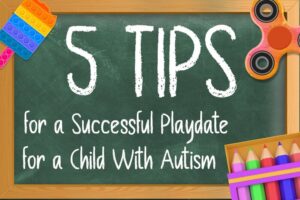Practicing social skills is something that many children with autism work on during ABA therapy. A great way for them to practice these skills is through playdates with friends.
According to a group of researchers, “for children with autism, play dates occur rarely, if ever, which may have a negative effect on opportunities to develop friendships.” Sadly, many playdates for children with autism never happen because parents may feel discouraged and overwhelmed about coordinating plans and knowing if their child is ready.
Although it may require a bit of planning and communication to make sure that everyone will be prepared, playdates that involve children with autism can be a great learning experience for everyone. Keep on reading for five tips that can help make your next playdate a big success.
Tip 1: Play Before the Playdate
Everyone can get a little nervous before a new experience. Whether it’s the first time your child has gone on a playdate or the tenth time, it never hurts to brush up on play skills with the family before the playdate occurs. Practicing play skills before the meetup may also give you a chance to break down the plan, what they can expect, and who will be involved.
Tip 2: Keep Some Things Familiar
A change in routine can be very challenging for children with autism. So, choosing a playmate that your child is already comfortable and familiar with, a location that they know (your home or a quiet park), or choosing a favorite activity to the itinerary could all be big factors in a successful playdate.
Tip 3: Less Is Often More
A playdate doesn’t have to last the whole day. When starting out, it may be best to keep it short and gradually add more time as your child gains more experience. Even 30 to 45 minutes can be greatly beneficial to a child with autism.
“Sometimes, the ideal time for the focus child may be very short. A half hour of intense interaction may be all that the child with disabilities can realistically tolerate,” explained Nancy Rosenberg, M.S. and Gusty-Lee Boulware, Ph.D. in Playdates for Young Children With Autism and Other Disabilities.
Rosenberg and Boulware both make another good point when they mention that neurotypical children may be used to longer playdates, so having some breaks or times when the neurotypical children can have some time outside or a quick lunch break can extend out the time of the playdate for both parties.
Tip 4: Structure!
Children with autism love structure. It’s important to have a plan set up that has a clear beginning and end. For example, starting out with a physical activity like hide-and-seek and then ending the play date by having snack time. Another important thing to remember is that you or another parent should always be present during a play date to help stay on track with the plan and to encourage the children to play together.
Although it’s great having a plan, things can often change, so being able to adapt to how your child is feeling or other factors that may come up will also be a great skill to master as you gain more experience with bringing your child with autism to a playdate.
Tip 5: Don’t Be Afraid to End the Playdate Early
Remember, the most important thing is that your child is comfortable during the playdate. If you notice that your child needs a break or wants to end the playdate early, don’t hesitate to make it happen. This may be especially true during your child’s first few playdates.
Learning From the Professionals
In conclusion, playdates can be an incredible opportunity for children with autism to develop social skills, build friendships, and have fun. By implementing these tips, you can increase the opportunities for successful and enjoyable playdates.
Remember to adapt to your child’s needs and with patience, preparation, and a supportive approach, which can help your child thrive during playdates and foster meaningful connections.
Already receiving ABA therapy from Applied ABC? If that’s the case, there may be opportunities to talk to your child’s ABA therapist about recommendations and tips that they may have about having a successful playdate.
Ready to learn more about our ABA therapy services? Click here!
Sources Cited
Koegel, R., et al., The Effectiveness of Contextually Supported Play Date Interactions Between Children With Autism and Typically Developing Peers.
Rosenberg, N. & Guste-Lee B., Playdates for Young Children With Autism and Other Disabilities.






